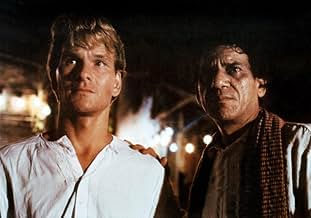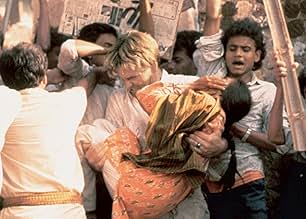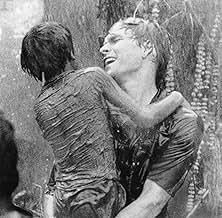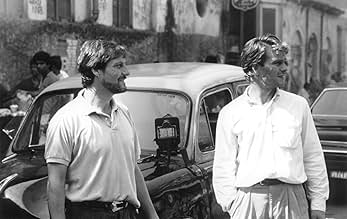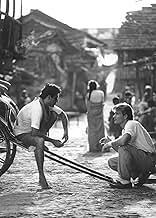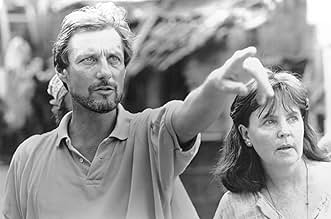IMDb-BEWERTUNG
6,5/10
5852
IHRE BEWERTUNG
Füge eine Handlung in deiner Sprache hinzuAn American doctor, a British nurse, and an illiterate Indian farmer unite to transform a Calcutta ghetto in this uplifting, inspirational movie starring Patrick Swayze and Pauline Collins.An American doctor, a British nurse, and an illiterate Indian farmer unite to transform a Calcutta ghetto in this uplifting, inspirational movie starring Patrick Swayze and Pauline Collins.An American doctor, a British nurse, and an illiterate Indian farmer unite to transform a Calcutta ghetto in this uplifting, inspirational movie starring Patrick Swayze and Pauline Collins.
- Regie
- Drehbuch
- Hauptbesetzung
- Auszeichnungen
- 1 Nominierung insgesamt
Empfohlene Bewertungen
10Pelrad
Bizarre reviews of this film that fail to explain why they are against its excellence don't stand up in the face of critics like Jim Whalley of Cinema Showcase who called it "the best picture of the year" and Susan Granger of WICC who commented that Patrick Swayze gave "the performance of a lifetime". This is the true story of a disillusioned American doctor who, like so many people, (the Beatles and Alanis Morisette, for example) travelled to India to find himself in a search for enlightenment. At first, he is unwilling to help the locals stand up against the oppressive 'godfather' of the area because he feels that all he'd be doing is trying to "drill a hole in water".
Having been to an English-speaking Third World country like India, myself, I found the reactions of the Swayze character extremely true to life. This seems to be the point that many viewers of the film don't seem to understand. I witnessed many Anglo-Americans in a Third World country surprising themselves by blowing up in anger at seeing the locals cowering away from injustice and later being transformed by the love and patience of the poor. I watched this movie while I was in Guyana and it was like an echo of many of the things I was going through and many of the events with which I had faced. Even the characters and their characteristics and reactions in the film matched many of the people I knew in that land!
"City of Joy" was an excellent and faithful adaption of Dominique Lapierre's richly written masterpiece. Om Puri's performance was deserving of an Academy Award. Patrick Swayze's character - his reactions to his surroundings - was extremely realistic. The conclusion of the film was beautifully touching. The strengths of American culture and Indian culture joined together - both races learned to accept one another's ways of life and borrowed virtues from one another's culture to breathe new life into the slums of Calcutta. "City of Joy" is one of the best movies ever made (10 out of 10).
Having been to an English-speaking Third World country like India, myself, I found the reactions of the Swayze character extremely true to life. This seems to be the point that many viewers of the film don't seem to understand. I witnessed many Anglo-Americans in a Third World country surprising themselves by blowing up in anger at seeing the locals cowering away from injustice and later being transformed by the love and patience of the poor. I watched this movie while I was in Guyana and it was like an echo of many of the things I was going through and many of the events with which I had faced. Even the characters and their characteristics and reactions in the film matched many of the people I knew in that land!
"City of Joy" was an excellent and faithful adaption of Dominique Lapierre's richly written masterpiece. Om Puri's performance was deserving of an Academy Award. Patrick Swayze's character - his reactions to his surroundings - was extremely realistic. The conclusion of the film was beautifully touching. The strengths of American culture and Indian culture joined together - both races learned to accept one another's ways of life and borrowed virtues from one another's culture to breathe new life into the slums of Calcutta. "City of Joy" is one of the best movies ever made (10 out of 10).
A child dies on an operating table in a Texas hospital. The surgeon, Max Lowe (Patrick Swayze), abandons his practice after the fatality and travels to Calcutta, leaving painful memories behind him. At the same time, in the Indian province of Bihar, Hasari and his family are quitting the land. Two years of drought have reduced them to despair, and now they are drifting to the city, hoping to make a new life there.
The story of the film is that of an impoverished community in Calcutta's backstreets, and how with Max Lowe's help the poor people learn to throw off the yoke of oppression. Max gives of his time and talent, and in return these simple folk teach him new perspectives, and enable him to come to terms with his own regrets.
This film is an example of American insensitivity at its worst. It is extremely patronising in its treatment of Indian society and crude in its handling social and moral issues. The film fails utterly to appreciate that a social system that has existed for thousands of years might not need 'straightening out' by a young man from a 200-year-old culture. All the standard American cliches are trotted out. People are urged to 'stand up and be counted', and to 'make choices in their lives'. Individualism and self-reliance are trumpeted brainlessly, as if they were eternal truths. This is the arrogance of youth. American exporters of films would do well to remember that there are ways of living that happen to be distinct from their own - and far wiser.
The plot is brain-numbingly simplistic. An evil Indian 'godfather' and his (even more evil) son are terrorising the City of Joy. Max preaches rebellion to the local people, exhorting them to reject the feudal system by which they have lived since time immemorial. He has been in India for three weeks, but he know best. The film blithely ignores three essential realities, because they happen to be inconvenient. Firstly, street dwellers such as these have to work too long and too hard, and are too worn down by malnutrition, to stage rebellions and construct new clinics on a foreigner's whim. Secondly, even if an age-old feudal system could be discarded overnight (and it can't), something has to fill the vacuum. The film doesn't come close to hinting what sort of social structure will supplant the godfather's regime. Thirdly, the film arrogantly assumes that the people would turn against their own, with whom they have ancient bonds of blood and custom, in order to side with an American stranger who knows nothing of their way of life, and who is free to pack up and leave whenever he wishes.
Indian people have to behave like Americans, lest they lose the sympathy of the American cinema audience. Poor families have to be too proud to beg for food, but this is nonsense in an Indian context. In reality, Hasari and his wife and children would beg without hesitation - and why shouldn't they? If a prostitute were to lure a foreigner into a robbery, would a local poor man tend the foreigner's wounds? And would the prostitute help him? The preparation of the new clinic is all meaningful bustle and smiling self-help, but these are the values of the American frontier, not the backstreets of Calcutta. Hasari's daughter chooses her husband western-style, via a romance, rather than the arranged marriage which would almost certainly happen in real life.
Everything comes about too easily. Hasari needs to double his income, so he does. Max earns the undying love of Calcutta's poor in a few weeks of grudging voluntary work. In the same timespan, the film gives us the full cycle of birth, death and marriage. People are slashed with razors and make complete (scar-free) recovery, without proper medical attention or modern pharmaceuticals. Max decides on the marriage, not the girl's family, and it's Max who takes the place of honour at the wedding ceremony. That's about as likely as water-skiing on the Ganges.
Ennio Morricone's score is extremely low-key, consisting of little more than a few sitar flourishes. It is almost as if the maestro is embarrassed to be associated with this shallow, tactless film. Max says he travelled to Calcutta to find enlightenment. He would stand a better chance if he didn't carry Texas along in his backpack.
The story of the film is that of an impoverished community in Calcutta's backstreets, and how with Max Lowe's help the poor people learn to throw off the yoke of oppression. Max gives of his time and talent, and in return these simple folk teach him new perspectives, and enable him to come to terms with his own regrets.
This film is an example of American insensitivity at its worst. It is extremely patronising in its treatment of Indian society and crude in its handling social and moral issues. The film fails utterly to appreciate that a social system that has existed for thousands of years might not need 'straightening out' by a young man from a 200-year-old culture. All the standard American cliches are trotted out. People are urged to 'stand up and be counted', and to 'make choices in their lives'. Individualism and self-reliance are trumpeted brainlessly, as if they were eternal truths. This is the arrogance of youth. American exporters of films would do well to remember that there are ways of living that happen to be distinct from their own - and far wiser.
The plot is brain-numbingly simplistic. An evil Indian 'godfather' and his (even more evil) son are terrorising the City of Joy. Max preaches rebellion to the local people, exhorting them to reject the feudal system by which they have lived since time immemorial. He has been in India for three weeks, but he know best. The film blithely ignores three essential realities, because they happen to be inconvenient. Firstly, street dwellers such as these have to work too long and too hard, and are too worn down by malnutrition, to stage rebellions and construct new clinics on a foreigner's whim. Secondly, even if an age-old feudal system could be discarded overnight (and it can't), something has to fill the vacuum. The film doesn't come close to hinting what sort of social structure will supplant the godfather's regime. Thirdly, the film arrogantly assumes that the people would turn against their own, with whom they have ancient bonds of blood and custom, in order to side with an American stranger who knows nothing of their way of life, and who is free to pack up and leave whenever he wishes.
Indian people have to behave like Americans, lest they lose the sympathy of the American cinema audience. Poor families have to be too proud to beg for food, but this is nonsense in an Indian context. In reality, Hasari and his wife and children would beg without hesitation - and why shouldn't they? If a prostitute were to lure a foreigner into a robbery, would a local poor man tend the foreigner's wounds? And would the prostitute help him? The preparation of the new clinic is all meaningful bustle and smiling self-help, but these are the values of the American frontier, not the backstreets of Calcutta. Hasari's daughter chooses her husband western-style, via a romance, rather than the arranged marriage which would almost certainly happen in real life.
Everything comes about too easily. Hasari needs to double his income, so he does. Max earns the undying love of Calcutta's poor in a few weeks of grudging voluntary work. In the same timespan, the film gives us the full cycle of birth, death and marriage. People are slashed with razors and make complete (scar-free) recovery, without proper medical attention or modern pharmaceuticals. Max decides on the marriage, not the girl's family, and it's Max who takes the place of honour at the wedding ceremony. That's about as likely as water-skiing on the Ganges.
Ennio Morricone's score is extremely low-key, consisting of little more than a few sitar flourishes. It is almost as if the maestro is embarrassed to be associated with this shallow, tactless film. Max says he travelled to Calcutta to find enlightenment. He would stand a better chance if he didn't carry Texas along in his backpack.
This movie is so deep that it touches your heart directly, specially the role played by om puri is inexpressible. Even the role played by patrick swayze was good as he plays an disillusioned doctor. All the casts played good role in the movie.
This movie touches the way of poor people living in calcutta slum, I know because I myself is a bengali and belong to calcutta. The way the poors were reflected in calcutta is actually the way they are treated.
The best quote of the movie was at the end when the movie ends and when om puri says "All that is not given is lost."
This movie touches the way of poor people living in calcutta slum, I know because I myself is a bengali and belong to calcutta. The way the poors were reflected in calcutta is actually the way they are treated.
The best quote of the movie was at the end when the movie ends and when om puri says "All that is not given is lost."
I don't know, if you have to have been in India to really appreciate this movie. It has flaws, but I think it is noticeable to see that the only person from India writing here, actually points out the up-sides to it.
By professional movie critics, it was very well received. And in my opinion, justifiably so. The movie brings up, many interesting subjects. One can discuss how well it deals with them, but if you're open towards the movie, it might bring you a very good real-life experience.
If this movie, has got you interested in more genuine Indian films, then movies such as Monsoon Wedding, and Lagaan, can be recommended.
By professional movie critics, it was very well received. And in my opinion, justifiably so. The movie brings up, many interesting subjects. One can discuss how well it deals with them, but if you're open towards the movie, it might bring you a very good real-life experience.
If this movie, has got you interested in more genuine Indian films, then movies such as Monsoon Wedding, and Lagaan, can be recommended.
To truly appreciate the characters of City of Joy, you have to read the book by the same name by Dominique Lapierre. Compared to its source material, the movie is a fairy tale. The hardships that the leading characters go through in the novel are gut wrenching and on more than one occasion almost made me cry. It was nice to see Patrick Swayze take his role head on and I think he did a marvelous job. Om Puri is one of the finest actors of Indian Cinema. If you like his work, I highly recommend "ArthSatya" (Half Truth) and "Paar" - the movies that established him as an intense actor. Also "Freedom At Midnight" by Dominique Lapierre is a great read, especially if you are interested in history. Again - it is not for anyone with a weak stomach.
Wusstest du schon
- WissenswertesAmongst the problems that beset the production were fire-bombings, mass demonstrations, media criticism, accusations of murder, a skyrocketing budget that eventually settled at the $27,000,000 mark, and Warner Bros.' 11th hour pullout that nearly bankrupted the producers.
- PatzerThe school girl in the rickshaw gets dropped daily to St. Xavier's School on Park Street - which is an all boys school.
- Zitate
Hasari Pal: All that is not given is lost.
Top-Auswahl
Melde dich zum Bewerten an und greife auf die Watchlist für personalisierte Empfehlungen zu.
- How long is City of Joy?Powered by Alexa
Details
Box Office
- Budget
- 27.000.000 $ (geschätzt)
- Bruttoertrag in den USA und Kanada
- 14.683.921 $
- Eröffnungswochenende in den USA und in Kanada
- 3.405.890 $
- 19. Apr. 1992
- Weltweiter Bruttoertrag
- 14.683.921 $
- Laufzeit2 Stunden 12 Minuten
- Farbe
- Seitenverhältnis
- 1.85 : 1
Zu dieser Seite beitragen
Bearbeitung vorschlagen oder fehlenden Inhalt hinzufügen



